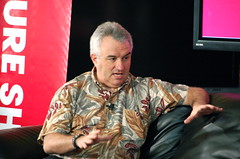Penmachine
04 February 2008
Can you make money from blogging and podcasting?
 As someone who's been a Vancouver blogger for more than seven years, and podcasting here for almost three, I often hear the question in the title of this post. But that's not what the questioners usually mean. What they want to ask is: Can you make a living from blogging and podcasting?
As someone who's been a Vancouver blogger for more than seven years, and podcasting here for almost three, I often hear the question in the title of this post. But that's not what the questioners usually mean. What they want to ask is: Can you make a living from blogging and podcasting?
The short answer is yes, but don't go and quit your day job just yet. I didn't say that just anyone should try to pay for your food, lodging, and transportation needs (plus those for your spouse and kids) from blogs and podcasts, or that you could make a huge living from them. It's possible, but I don't do it, and haven't even tried. You should be aware that, just like anything else, making a living online would be a job, not some sort of free-money fantasy life.
My wife, who's also a blogger and podcaster, and I were talking about it this morning before she went to work (she's had the same stable, rewarding, good-paying professional day job for more than 15 years, and isn't planning on quitting that anytime soon). For us, our online activities are hobbies. They bring in a little money from ads and sponsorships, usually enough to cover their costs and maybe buy the occasional dinner.
Blogging for money
 The people I know who work as bloggers, like Arieanna, work hard. She writes at least five different work blogs (plus others) all day, every day, sometimes until late at night. (If I had to scour the news for links about Mischa Barton all day, I'd probably go batty. And that's just one blog.)
The people I know who work as bloggers, like Arieanna, work hard. She writes at least five different work blogs (plus others) all day, every day, sometimes until late at night. (If I had to scour the news for links about Mischa Barton all day, I'd probably go batty. And that's just one blog.)
If you look at blogs that are popular enough to pay people's salaries—like Arieanna's and the others at b5media, or the Weblogs Inc. network that includes Engadget and its siblings, or successful independent blogs like Daring Fireball—they tend to be very focused and updated many times a day.
They often attract lots of comments, which require moderation and feedback, and their posts tend to be well sourced or individually researched, and also well written and concise. In many cases, the words are carefully crafted to attract search engine traffic, and the blogger may spend quite a bit of time writing about things he or she isn't all that interested in, or at least (as in any job) may have days where the job is just a slog, rather than a joy. Money-generating blogs take a lot of effort, skill, and time to maintain. They're work.
In other words, don't expect to dash off a paragraph every couple of days about what your kids ate for breakfast and have the ad revenue pour in.
Now, if you can find a day job where you spend a significant part of your time blogging, that's another matter. If I weren't on medical leave right now, I'd be doing that over here (notice that the "Daily Blog" isn't very daily while I'm absent). But that blog—and private internal blogs and wikis the company runs behind a firewall—is just a slice of my day job, not the whole thing, so I don't think it counts either.
Podcasting for money
 Podcasting, as an even newer medium than blogging, has an even less-established income stream. Search engine optimization and contextual advertising don't work as well for podcasts, audio or video. Like most bloggers (and like me), the vast majority of podcasters do what they do as a hobby. They (like me) might bring in a bit of cash from sponsors and podcast network advertising and so on. But podcast production is even more labour-intensive than blogging, and unless you put out shows quite frequently and build a significant audience on an appropriate topic (or topics, if you can manage several shows), it will be pretty hard to pay a mortgage.
Podcasting, as an even newer medium than blogging, has an even less-established income stream. Search engine optimization and contextual advertising don't work as well for podcasts, audio or video. Like most bloggers (and like me), the vast majority of podcasters do what they do as a hobby. They (like me) might bring in a bit of cash from sponsors and podcast network advertising and so on. But podcast production is even more labour-intensive than blogging, and unless you put out shows quite frequently and build a significant audience on an appropriate topic (or topics, if you can manage several shows), it will be pretty hard to pay a mortgage.
Even Leo Laporte, whose This Week in Tech (TWiT) network attracts some of the biggest audiences in podcasting (numbering the hundreds of thousands each week), and who runs an extremely efficient podcasting operation largely by himself, still has a day job. Several, in fact. He remains a widely syndicated radio host, as he has been for decades, and also helms a cable TV show on which I've appeared (as a guest paid only in exposure and with a free take-out lunch) a few times.
Leo probably could make his podcasts a full-time gig, but presumably chooses instead to funnel what money he gets back into the network and to honoraria for his guest hosts. Others, like podcast pioneer Adam Curry, have used venture funding to create a buffer while they try to build businesses like PodShow into something large and viable.
Individual podcasters who work hard can also make a job of it. No one I know well does that, but among the tens of thousands of podcasts out there, a small number can keep their hosts fed, clothed, and housed. Again, those tend to be focused, well produced, frequent—and lucky. If you got into the game early, or happened to hit a certain niche at just the right time, or worked hard on a concept that struck a chord with the (still relatively small) podcasting audience, and then hustle like hell, you might be able to quit that day job, if that's what you want.
It used to be about the music, man...
 In many ways, being a podcaster or blogger is like being a musician. Far more people play music, or blog, or podcast, for fun than make a living at it. I was a full-time musician for awhile in the early '90s, and it was tough work, with long hours, lots of low-budget travel (not a requirement online, fortunately), and crappy pay. I quit after I got married, because that life wasn't what I wanted long term.
In many ways, being a podcaster or blogger is like being a musician. Far more people play music, or blog, or podcast, for fun than make a living at it. I was a full-time musician for awhile in the early '90s, and it was tough work, with long hours, lots of low-budget travel (not a requirement online, fortunately), and crappy pay. I quit after I got married, because that life wasn't what I wanted long term.
The people I know who have made a career of music—and several of the guys in my band do just that, even though I haven't—aren't Rock Stars. They're working professionals. They do a lot of different things: they teach music, work as studio sidemen, tour with established acts, make instructional videos, play at casinos, entertain at weddings and corporate meetings, compose soundtracks, produce and engineer other acts, give seminars, and record jingles. They keep accounts, pay taxes, save money for retirement, buy health insurance, and run their careers as businesses.
I think anyone looking to work in blogging in podcasting is going to have to do something similar. Be professional, work hard. Use your online activities as leverage to do other things. Even in my blog's early days, it didn't make me any direct money at all, but it brought in plenty of work when I was a freelance technical writer and editor. Similarly, being an expert blogger or podcaster (or even better, both) can help you make money in other ways—such as helping other people and organizations make blogging and podcasting part of what they do.
It's not magic, it's work
 If you're going to make money online, you'll need an entrepreneurial impulse, or you'll need to work with others who do. You need to know how these new media work, and how to promote and take advantage of them in all sorts of ways.
If you're going to make money online, you'll need an entrepreneurial impulse, or you'll need to work with others who do. You need to know how these new media work, and how to promote and take advantage of them in all sorts of ways.
The Web and its technologies are still a frontier, and you'll probably have to bust your butt to succeed. You need to flexible and see opportunities you might not expect—selling cool T-shirts and mugs and stuff might make you more dough than any kind of sponsorship or advertising, for instance.
Or, if you're like me, you might prefer to let your blogs and podcasts be fun things that you do on the side, not something that you have to do every day, and which might burn you out after awhile.
The Internet is pretty damn cool, but it's not magic. Those who succeed on it are the same ones who succeed anywhere: they're smart, skilled, and have good ideas. They make realistic plans and knuckle down to put them in action. They hustle. And sometimes they fail and have to try again with a wiser view.
Labels: b5media, blog, johngruber, leolaporte, linkbait, money, podcast, web